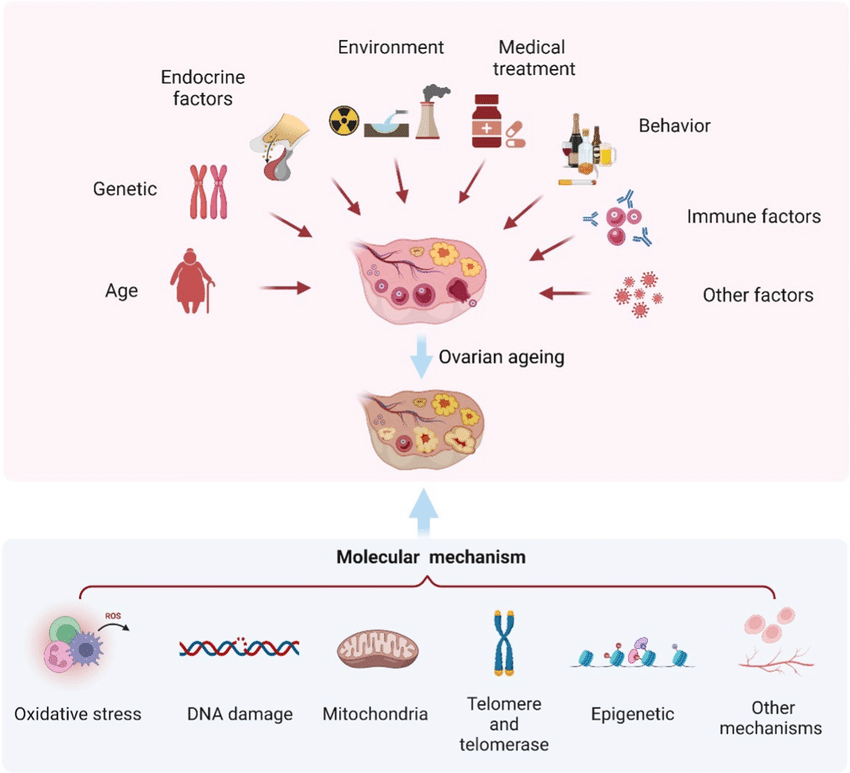What Is Ovarian Aging? Understanding Diminished Ovarian Reserve in IVF
Alright fellow IVF chefs, I think it’s time to switch gears from IVF medication and shift to IVF lab success factors and lab insights. First, we think it’s best to go over what ovarian aging is!
Ovarian aging is a natural biological process where a woman’s ovaries gradually lose their reproductive potential over time. This decline affects both the quantity and quality of eggs, ultimately leading to reduced fertility. For women undergoing in vitro fertilization (IVF), understanding diminished ovarian reserve (DOR) is crucial, as it significantly impacts treatment success.
What Causes Ovarian Aging?
Women are born with a finite number of eggs (approximately 1-2 million at birth), which decreases over time. By puberty, only about 300,000–500,000 remain, and this number continues to decline with each menstrual cycle. Unlike men, who produce sperm throughout their lives, women cannot generate new eggs.
Several factors contribute to ovarian aging:
Age: The most significant factor. After 35, egg quantity and quality decline rapidly.
Genetics: Some women experience early ovarian aging due to genetic predispositions (e.g., Fragile X premutation).
Medical Conditions: Endometriosis, autoimmune diseases, and prior ovarian surgeries can accelerate ovarian decline.
Lifestyle Factors: Smoking, excessive alcohol, and poor nutrition may hasten ovarian aging.
What Is Diminished Ovarian Reserve (DOR)?
Diminished ovarian reserve (DOR) occurs when the ovaries contain fewer eggs than expected for a woman’s age. Unlike menopause, which marks the end of fertility, DOR means reduced fertility potential but not necessarily sterility.
Diagnosing DOR
Fertility specialists use several tests to assess ovarian reserve:
Anti-Müllerian Hormone (AMH): Low AMH levels (<1.0 ng/mL) suggest reduced ovarian reserve.
Follicle-Stimulating Hormone (FSH): High FSH (>10 IU/L) on day 3 of the menstrual cycle indicates declining ovarian function.
Antral Follicle Count (AFC): A transvaginal ultrasound counts small follicles (fewer than 5-7 may indicate DOR).
Impact of DOR on IVF Success
Women with DOR often face challenges in IVF, including:
Poor Response to Stimulation: Fewer eggs retrieved per cycle.
Lower Pregnancy Rates: Reduced egg quality affects embryo viability.
Higher Cancellation Rates: Some cycles may be canceled due to insufficient follicle growth.
However, IVF with DOR is not impossible. Strategies like:
Higher Dosage of Stimulation Medications (though excessive doses may not help).
Mini-IVF or Natural Cycle IVF (using fewer medications).
Donor Eggs (for severe DOR cases).
While we are strictly discussing age in this session, many things can affect ovarian aging. Take a look at the image below to get an idea of the possible external factors.
Can Ovarian Aging Be Reversed?
Currently, no treatment can reverse ovarian aging, but some approaches may help optimize fertility:
Lifestyle Changes: Healthy diet, quitting smoking, and managing stress.
Supplements: CoQ10, DHEA (under medical supervision), and vitamin D may support egg quality.
Early Intervention: Freezing eggs at a younger age preserves fertility.:
IVF Protocols: Tailored IVF protocols with higher doses of stimulation medications may be employed to maximize egg retrieval.
Egg Donation: For some women, using donor eggs can offer a higher chance of successful pregnancy.
Adjunct Therapies: Emerging research suggests that certain antioxidants may improve oocyte quality, though further studies are needed to confirm efficacy.
Scientists may be working on a cure. Check out this article from National Geographic!
Conclusion
Ovarian aging is inevitable, but understanding DOR helps women make informed fertility decisions. While IVF success rates may be lower with DOR, personalized treatment plans can still offer hope. Consulting a fertility specialist early is key to exploring the best options.
This is quite the complicated topic so feel free to check out these articles with helpful images. Here or here!
Please don’t let this discourage you or anyone from moving forward with IVF. Women with diminished ovarian reserve have still had high success rates. We only want to educate and inform about the possible struggles women with DOR may encounter on their journey. We’re rooting for you!
“Ovarian aging? Honey, my eggs are out here collecting dust like a fine wine cellar—except no one told me they expire instead of getting better with age!”
